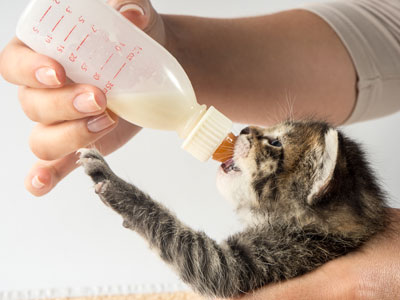By opening your home to a cat or kitten while it waits for a new owner, you can help local animal shelters save more homeless animals.

©Halfpoint /Adobe Stock
Wondering how you can help your local animal shelter or rescue group find permanent homes for the cats and kittens in their charge? Sometimes all it takes is offering the homeless pets a temporary place to stay. Becoming a foster parent to homeless cats and kittens helps the rescue groups and the animals—and it may reward you in subtle ways, too.
Animal rescue groups often work with willing foster homes to provide care for cats and kittens for several reasons, one of the most obvious being lack of space. By placing cats and kittens in temporary private homes, the groups can free up space for more animals, potentially leading to more pets in permanent homes. Foster parents also can provide valuable input on the temperament and personality of particular cats, as they spend much more time in their company.
In other cases, a cat or kitten may need specialized care that is more easily provided by a foster parent. Perhaps the cat is recovering from medical care and needs a quiet home with one-on-one attention. Sometimes rescue groups need to place very young kittens with foster parents who can provide the additional feedings needed.

©DHstudio/Adobe Stock
Or, a cat may simply not thrive well in a shelter situation and may become a better candidate for adoption if placed in a foster home. By opening your home to these pets, you can help socialize a cat who has not had as much exposure to a loving human family. You can also work with an older pet who is stressed in a shelter situation, perhaps having lived as the only pet in the household most of its life.
While providing a foster home is not much different from adopting a cat on a permanent basis, there are some ways you can set yourself up for fostering success.
- Set up a quiet space separate from the rest of your household for your new guest, such as a spare bedroom or bathroom. Provide all the comforts: a bed, a litterbox, and food and water bowls. Having his own retreat will help him adjust to the situation.
- Keep the foster cat away from your own pets at first. You want to ensure he is healthy before introducing him to your pets.
- When your guest receives a clean bill of health, begin introducing him to the rest of your household. The goal often is to socialize the foster cat to other pets and humans to make him a good candidate for adoption.
- That said, let the foster cat adjust to you on his terms. Spend time in his company and let him investigate you when he is comfortable.
- Watch the cat for signs of stress or illness. For example, he may not eat much at first, but if he goes longer than a day without eating, inform the adoption group right away.
When you open your home to cats and kittens waiting to be adopted, you also open your heart to the personalities and charm of your temporary guests. Who knows—you may just find the pet you’ve been waiting for when that sweet foster cat comes through your doors.





